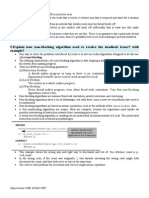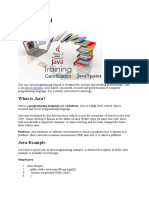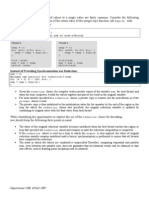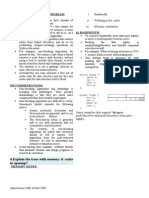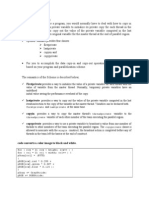X X X - Old X - New Op (X - Old) Interlockedcompareexchange X X - Old
X X X - Old X - New Op (X - Old) Interlockedcompareexchange X X - Old
Uploaded by
bsgindia82Copyright:
Available Formats
X X X - Old X - New Op (X - Old) Interlockedcompareexchange X X - Old
X X X - Old X - New Op (X - Old) Interlockedcompareexchange X X - Old
Uploaded by
bsgindia82Original Description:
Original Title
Copyright
Available Formats
Share this document
Did you find this document useful?
Is this content inappropriate?
Copyright:
Available Formats
X X X - Old X - New Op (X - Old) Interlockedcompareexchange X X - Old
X X X - Old X - New Op (X - Old) Interlockedcompareexchange X X - Old
Uploaded by
bsgindia82Copyright:
Available Formats
One way to solve the problems introduced by locks is to not use locks.Algorithms designed to do this are called non-blocking.
The defining characteristic of a non-blocking algorithm is that stopping a thread does not prevent the rest of the system from making progress. There are different non-blocking guarantees:
(i)Obstruction freedom: A thread makes progress as long as there is no contention but live lock is possible. !"ponential backoff can be used to work around live lock. (ii)#ock freedom.: The system as a whole makes progress. (iii)$ait freedom: !very thread makes progress even when faced with contention. %ery few non-blocking algorithms achieve this.
&on-blocking algorithms are immune from lock contention priority inversion and convoying. &on-blocking algorithms have a lot of advantages but with these come a new set of problems that need to be understood. &on-blocking algorithms are based on atomic operations such as the methods of the Interlocked class. A few nonblocking algorithms are simple. 'ost are comple" because the algorithms must handle all possible interleaving of instruction streams from contending processors. A trivial non-blocking algorithm is counting via an interlocked increment instead of a lock. The interlocked instruction avoids lock overhead and pathologies.
*n the wrong code if the count was originally + two threads e"ecuting the wrong code might both decrement the count and then both see it as ,ero at the same time. The correct code performs the decrement and test as a single atomic operation. 'ost non-blocking algorithms involve a loop that attempts to perform an action using one or more compare-and-swap (-A.) operations and retries when one of the -A. operations fails. A simple and useful e"ample is implementing a thread-safe fetch-and-op. A fetch-and-op reads a value from a location computes a new value from it and stores the new value. *n e"ample both a locked version and a nonblocking version that operate on a location x. The non-blocking version reads location x into a local temporary x_old and computes a new value x_new = op(x_old). The routine InterlockedCompareExchange stores the new value unless x is now different than x_old.
-omparison of #ocked and #ockless -ode for /etch-and-op void LockedFetchAndOp( long& x ) ac!"ire lock x = op(x)# relea$e lock % void &on'lockingFetchAndOp( volatile long& x ) long x_old( x_new( x_wa$# do x_old = x# x_new = op(x_old)# x_wa$ = InterlockedCompareExchange(&x( x_new( x_old)# % while( x_wa$)=x_old )# % ABA PROBLEM: *n -omparison of #ocked and #ockless -ode for /etch-and-op there is a time interval
This e"ample shows the wrong way and right way to decrement and test of the reference count is p-(ref)count.
Department CSE, SCAD CET
between when a thread e"ecutesx_old = xand when the thread e"ecutes InterlockedCompareExchange. 0uring this interval other processors might perform other fetchand-op operations. /or e"ample suppose the initial value read is A. An intervening se1uence of fetch-and-op operations by other processorsmight change " to 2 and then back to A. $hen the original thread e"ecutes InterlockedCompareExchange it will be as if the other processor3s actions never happened. As long as the order in which op ise"ecuted does not matter there is no problem. The net result is the same as if the fetch-and-op operations were reordered such that the intervening se1uence happens before the first read. 2ut sometimes fetch-and-op has uses where changing " from A to 2 to A does make a difference. The problem is indeed known as the A2A problem.
#ockless *mplementation of a #inked .tack that 'ay .uffer from A2A 4roblem &ode* +op# ,, -ointer to top item on $tack. void 'rokenLockle$$-"$h( &ode* node ) Item *t_old( t_wa$# do Item* t_old = +op# n/0next = t_old# t_wa$ = InterlockedCompareExchange(&+op(node(t_old)# % while( t_wa$)=t_old )# % Item* 'rokenLockle$$-op() Item *t_old( *t_wa$( *t_new# do t_old = +op# t_new = t_old/0next# ,, A'A pro1lem ma2 $trike 1elow) t_wa$ = InterlockedCompareExchange(&+op(t_new(t_old)# % while( t_wa$)=t_old )# ret"rn t_old# %
Department CSE, SCAD CET
You might also like
- Freebitco Hack AutobetDocument38 pagesFreebitco Hack Autobetmadarauchiha75% (4)
- 5.explain How Non-Blocking Algorithm Used To Resolve The Deadlock Issues? With Example?Document3 pages5.explain How Non-Blocking Algorithm Used To Resolve The Deadlock Issues? With Example?bsgindia82No ratings yet
- FALLSEM2023-24 BCSE303L TH VL2023240100786 2023-06-05 Reference-Material-IDocument30 pagesFALLSEM2023-24 BCSE303L TH VL2023240100786 2023-06-05 Reference-Material-IBBM SathvikNo ratings yet
- MultiThreadedProgrammingDocument37 pagesMultiThreadedProgrammingNikunj Shah3540No ratings yet
- 5-Implementing Synchronization OperationsDocument4 pages5-Implementing Synchronization OperationsKurumeti Naga Surya Lakshmana KumarNo ratings yet
- CS347 04 Process SyncDocument14 pagesCS347 04 Process SyncahilanNo ratings yet
- Hardware SynchronizationDocument15 pagesHardware SynchronizationMarium naeemNo ratings yet
- Concurrency NDocument3 pagesConcurrency Nnerdyall51No ratings yet
- Java Interview Questions: What Are Native Methods in Java?Document9 pagesJava Interview Questions: What Are Native Methods in Java?Sabari NathanNo ratings yet
- Practice Problems: Concurrency: Lectures On Operating Systems (Mythili Vutukuru, IIT Bombay)Document38 pagesPractice Problems: Concurrency: Lectures On Operating Systems (Mythili Vutukuru, IIT Bombay)N S SujithNo ratings yet
- MCP-Unit 2Document77 pagesMCP-Unit 2Sarath PathariNo ratings yet
- Executorservice in JavaDocument33 pagesExecutorservice in JavaIsra Sha'lanNo ratings yet
- OPENMP Language Features - Part 1 - 2Document38 pagesOPENMP Language Features - Part 1 - 2Ram KiranNo ratings yet
- Multithreading and Exception HandlingDocument40 pagesMultithreading and Exception HandlingBalakrishnan.GNo ratings yet
- Ecole Militaire Polytechnique: ContentDocument15 pagesEcole Militaire Polytechnique: ContentTarak KaiNo ratings yet
- Process Synchronization or Coordination Seeks To MakeDocument10 pagesProcess Synchronization or Coordination Seeks To MakeKenneth MananganNo ratings yet
- OS_7__Synchronization_ToolsDocument36 pagesOS_7__Synchronization_ToolswbmsheikhNo ratings yet
- 4 LoopsDocument30 pages4 LoopsThirukkuralkaniNo ratings yet
- chapter 6.pptx (1)Document34 pageschapter 6.pptx (1)advaithacharya2000No ratings yet
- Datarace DeadlockDocument4 pagesDatarace Deadlockbsgindia82No ratings yet
- Fence-Free Work Stealing On Bounded TSO ProcessorsDocument25 pagesFence-Free Work Stealing On Bounded TSO ProcessorsZeeshan SyedNo ratings yet
- Interprocess Communication and SynchronizationDocument30 pagesInterprocess Communication and Synchronizationansep12No ratings yet
- Synchronization Between ThreadsDocument7 pagesSynchronization Between ThreadshariNo ratings yet
- Process Synchronization Reviewer 065012Document4 pagesProcess Synchronization Reviewer 065012charlottekatakuri584No ratings yet
- OpenMP 2Document3 pagesOpenMP 2thatsarraNo ratings yet
- Topics 134-152Document33 pagesTopics 134-152sazadinazaNo ratings yet
- Synchronization PrimitivesDocument14 pagesSynchronization Primitiveshaani104No ratings yet
- CoursVHDL 01processDocument38 pagesCoursVHDL 01processavenirsireneNo ratings yet
- Multi-Core in JAVA/JVM: Concurrency Prior To Java 5: Synchronization and ThreadsDocument14 pagesMulti-Core in JAVA/JVM: Concurrency Prior To Java 5: Synchronization and ThreadsShravan KumarNo ratings yet
- Process SynchronizationDocument9 pagesProcess SynchronizationLata SinhaNo ratings yet
- 000-Lecture 7 -Process SynchronizationDocument24 pages000-Lecture 7 -Process SynchronizationSeif.A. SayedNo ratings yet
- Nachos Assignment #1: Build A Thread System Tom Anderson Computer Science 162 Due Date: Tuesday, Sept. 21, 5:00 P.MDocument8 pagesNachos Assignment #1: Build A Thread System Tom Anderson Computer Science 162 Due Date: Tuesday, Sept. 21, 5:00 P.Mapi-19825490No ratings yet
- OS-Lab9-manual 2Document13 pagesOS-Lab9-manual 2Mian AmirNo ratings yet
- Ksync NotesDocument6 pagesKsync NotesRAMUNo ratings yet
- 8 (Synchronization) : AnswerDocument8 pages8 (Synchronization) : Answerdfg68No ratings yet
- Java MultithreadingDocument23 pagesJava Multithreadingm tousifNo ratings yet
- ThreadsDocument92 pagesThreadskNo ratings yet
- Thread: Tanjina HelalyDocument38 pagesThread: Tanjina Helalytomar amiNo ratings yet
- Ass2 AnswersDocument8 pagesAss2 AnswersNeha PatilNo ratings yet
- Lead The Flow: Section 4Document3 pagesLead The Flow: Section 4Catalin BoteaNo ratings yet
- Interview QuestionDocument24 pagesInterview QuestionShaikh AbdulNo ratings yet
- Cache Line Ping PongDocument1 pageCache Line Ping Pongbsgindia82No ratings yet
- Java ThreadDocument36 pagesJava Threadthirtyseven93No ratings yet
- Chapter 9-Verilog Behavioral ModelingDocument55 pagesChapter 9-Verilog Behavioral ModelingThắng Lê NhựtNo ratings yet
- Introduction To Asynchronous Services and Active ObjectsDocument8 pagesIntroduction To Asynchronous Services and Active ObjectsJuhi BansalNo ratings yet
- Programming Assignment 2: Priority Queues and Disjoint SetsDocument11 pagesProgramming Assignment 2: Priority Queues and Disjoint SetsAnanya KallankudluNo ratings yet
- Testbench ECECPE pt1Document31 pagesTestbench ECECPE pt1Christopher VelosoNo ratings yet
- Mila LinearizabilityDocument60 pagesMila LinearizabilityguptaNo ratings yet
- Programming Assignment 2: Priority Queues and Disjoint SetsDocument11 pagesProgramming Assignment 2: Priority Queues and Disjoint SetsDaniel SerranoNo ratings yet
- Verilog Interview QuestionsDocument39 pagesVerilog Interview QuestionsV Sharma100% (1)
- Operating System SolutionsDocument19 pagesOperating System SolutionsRameshNo ratings yet
- Swift TermsDocument12 pagesSwift TermsdragosncsmNo ratings yet
- AVLSI_MODULE4Document93 pagesAVLSI_MODULE4parvati.patilNo ratings yet
- UNIT2 - Logic Design With Behavioral Models of Combinational and Sequential LogicDocument48 pagesUNIT2 - Logic Design With Behavioral Models of Combinational and Sequential Logicnavadeepreddy1624No ratings yet
- CSC302 SlidesDocument81 pagesCSC302 Slidestobianimashaun99No ratings yet
- Operating Systems Lecture Notes Deadlock: Martin C. RinardDocument6 pagesOperating Systems Lecture Notes Deadlock: Martin C. RinardKurumeti Naga Surya Lakshmana KumarNo ratings yet
- Concurrent Programming Using ThreadsDocument25 pagesConcurrent Programming Using ThreadsNadar Dinakaran SankaravelNo ratings yet
- Chapter 3 OSDocument23 pagesChapter 3 OSyashpatilyp2004No ratings yet
- BE EXPERT IN JAVA Part- 2: Learn Java programming and become expertFrom EverandBE EXPERT IN JAVA Part- 2: Learn Java programming and become expertNo ratings yet
- Java TutorialDocument23 pagesJava Tutorialbsgindia82No ratings yet
- Java TutorialDocument13 pagesJava Tutorialbsgindia82No ratings yet
- Java Platforms / Editions: 3) Enterprise ApplicationDocument11 pagesJava Platforms / Editions: 3) Enterprise Applicationbsgindia82No ratings yet
- Mung Chiang Sangtae Ha: System Modelling & Advancement in Research Trends (SMART), International ConferenceDocument6 pagesMung Chiang Sangtae Ha: System Modelling & Advancement in Research Trends (SMART), International Conferencebsgindia82No ratings yet
- Java Example: Platform: Any Hardware or Software Environment in Which A Program Runs, Is Known As ADocument12 pagesJava Example: Platform: Any Hardware or Software Environment in Which A Program Runs, Is Known As Absgindia82No ratings yet
- Java TutorialDocument13 pagesJava Tutorialbsgindia82No ratings yet
- Database: Rdbms MongodbDocument7 pagesDatabase: Rdbms Mongodbbsgindia82No ratings yet
- The Tungabhadra RiverDocument4 pagesThe Tungabhadra Riverbsgindia82No ratings yet
- Differences DBMS RDBMSDocument4 pagesDifferences DBMS RDBMSbsgindia82No ratings yet
- Knowledge-Based SystemsDocument1 pageKnowledge-Based Systemsbsgindia82No ratings yet
- Copyin: Department CSE, SCAD CETDocument2 pagesCopyin: Department CSE, SCAD CETbsgindia82No ratings yet
- Example:: Static Runtime Dynamic GuidedDocument2 pagesExample:: Static Runtime Dynamic Guidedbsgindia82No ratings yet
- Data GridDocument7 pagesData Gridbsgindia82No ratings yet
- Deadlock Free CodeDocument2 pagesDeadlock Free Codebsgindia82No ratings yet
- Mung Chiang Sangtae Ha: Surve Yon Fog Comp UtingDocument2 pagesMung Chiang Sangtae Ha: Surve Yon Fog Comp Utingbsgindia82No ratings yet
- Department CSE, SCAD CETDocument2 pagesDepartment CSE, SCAD CETbsgindia82No ratings yet
- Cache Line Ping-Ponging:: Department CSE, SCAD CETDocument2 pagesCache Line Ping-Ponging:: Department CSE, SCAD CETbsgindia82No ratings yet
- Effective Use of Reduction:: Department CSE, SCAD CETDocument1 pageEffective Use of Reduction:: Department CSE, SCAD CETbsgindia82No ratings yet
- Protecting Updates of Shared VariablesDocument2 pagesProtecting Updates of Shared Variablesbsgindia82No ratings yet
- Interleaving Single & Multiple Thread For Execution:: Department CSE, SCAD CETDocument1 pageInterleaving Single & Multiple Thread For Execution:: Department CSE, SCAD CETbsgindia82No ratings yet
- Schedule (Dynamic) Schedule (Dynamic) Schedule (Dynamic, 16) : Parallel Pragma Suspend or Resume of ThreadDocument1 pageSchedule (Dynamic) Schedule (Dynamic) Schedule (Dynamic, 16) : Parallel Pragma Suspend or Resume of Threadbsgindia82No ratings yet
- Memory Reclamation Problem:: I. Bandwidth Ii. Working in The Cache Iii. Memory ContentionDocument1 pageMemory Reclamation Problem:: I. Bandwidth Ii. Working in The Cache Iii. Memory Contentionbsgindia82No ratings yet
- Work-Sharing Sections:: Department CSE, SCAD CETDocument2 pagesWork-Sharing Sections:: Department CSE, SCAD CETbsgindia82No ratings yet
- Factors Affecting Performance of ProgramDocument2 pagesFactors Affecting Performance of Programbsgindia82No ratings yet
- Cache Line Ping PongDocument1 pageCache Line Ping Pongbsgindia82No ratings yet
- Memory ConsistyencyDocument1 pageMemory Consistyencybsgindia82No ratings yet
- Data Race Conditions:: Department CSE, SCAD CETDocument1 pageData Race Conditions:: Department CSE, SCAD CETbsgindia82No ratings yet
- Data Copy in Copy OutDocument2 pagesData Copy in Copy Outbsgindia82No ratings yet
- 2 Fundamentals - of - Blockchain - TechnologyDocument38 pages2 Fundamentals - of - Blockchain - TechnologyAbhay TiwariNo ratings yet
- Distributed Computer System (Final Exam)Document18 pagesDistributed Computer System (Final Exam)Donib PoonNo ratings yet
- Computer Science Study Abroad Handbook 2023 2024Document23 pagesComputer Science Study Abroad Handbook 2023 2024BRAHMJOT SINGHNo ratings yet
- 2-3-Process SyncDocument64 pages2-3-Process SyncTharun RevinthNo ratings yet
- How To Send Bitcoin From Cashapp - Google SearchDocument1 pageHow To Send Bitcoin From Cashapp - Google Searchpejaylee2No ratings yet
- Cloud Computing - KCS713 - UNIT-1 NotesDocument11 pagesCloud Computing - KCS713 - UNIT-1 NotesstealthyhistorianNo ratings yet
- 1544523950771EN Workbook Cryptocurrencies Explained Simply 1Document20 pages1544523950771EN Workbook Cryptocurrencies Explained Simply 1Vinh VũNo ratings yet
- Bda Assignment - 2Document3 pagesBda Assignment - 2Siddharth ChoudharyNo ratings yet
- CC-handout Jan 2023-May 2023Document2 pagesCC-handout Jan 2023-May 2023AnimagusNo ratings yet
- DC Module 4Document78 pagesDC Module 42021.shreya.pawaskarNo ratings yet
- Programming Distributed Systems P310-FeldmanDocument7 pagesProgramming Distributed Systems P310-FeldmanchuckuNo ratings yet
- B.tech. 3rd Yr CSE(IOT) 2022 23 RevisedDocument32 pagesB.tech. 3rd Yr CSE(IOT) 2022 23 Revised2021bcs009No ratings yet
- Map ReduceDocument7 pagesMap Reducecollegebuddiesroasted678No ratings yet
- LockingDocument8 pagesLockingDaniel ManoNo ratings yet
- HPC Mini ProjectDocument5 pagesHPC Mini Projectvaibhavakokitkar07No ratings yet
- Parallel and Distributed Transaction Processing: Practice ExercisesDocument4 pagesParallel and Distributed Transaction Processing: Practice ExercisesDivyanshu BoseNo ratings yet
- Manajemen Proxy Server Dan Hak Akses Internet Menggunakan SQUID Di Universitas MuliaDocument8 pagesManajemen Proxy Server Dan Hak Akses Internet Menggunakan SQUID Di Universitas MuliaHanifah AnandaNo ratings yet
- Coinmarketcap Com Currencies FiroDocument2 pagesCoinmarketcap Com Currencies FiroAaatv AaabbbNo ratings yet
- Module 1Document118 pagesModule 1joshiNo ratings yet
- My DadDocument3 pagesMy DadthelmaalvesdeabreublogNo ratings yet
- Week-1 - Lecture Notes of NPTELDocument126 pagesWeek-1 - Lecture Notes of NPTELChinmayi HSNo ratings yet
- Map ReduceDocument33 pagesMap Reducecellule HD HD100% (1)
- DMS Exp 8-23-24Document39 pagesDMS Exp 8-23-24nandaprem301No ratings yet
- Bit CoinDocument16 pagesBit CoinPriti KumariNo ratings yet
- Function Distributed Database Management SystemsDocument7 pagesFunction Distributed Database Management SystemsAqab ButtNo ratings yet
- Crypto - Trading - For - Beginner - Traders - PDF MocDocument12 pagesCrypto - Trading - For - Beginner - Traders - PDF MocVivek ChadhaNo ratings yet
- AWS Essentials FPDocument2 pagesAWS Essentials FPLynch GeorgeNo ratings yet
- 3710213_mergedDocument7 pages3710213_mergedKashyap SutharNo ratings yet
- Fast Serializable Multi-Version Concurrency Control For Main-Memory Database SystemsDocument13 pagesFast Serializable Multi-Version Concurrency Control For Main-Memory Database Systemstes firstNo ratings yet

